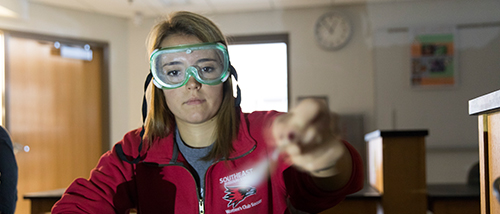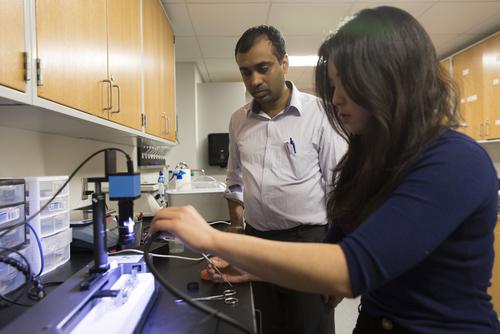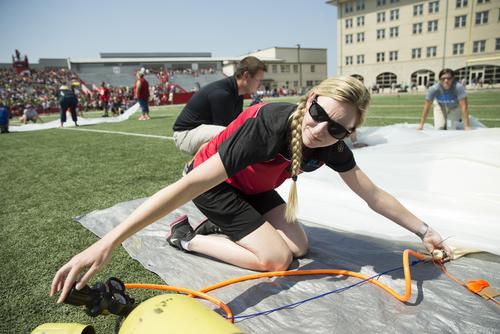Physics Education
Continue to main content
Physics Education Degree Map
Explore the courses you'll need to complete your degree.
Outcomes & Careers
-
$77k
Secondary School Teacher
According to the Bureau of Labor Statistics, the mean annual salary for a secondary school teacher is $73,700.
-
$59k
Laboratory Technician
According to the Bureau of Labor Statistics, the mean annual salary for a laboratory technician is $59,130.
-
$105k
Postsecondary Physical Sciences Teacher
According to the Bureau of Labor Statistics, the mean annual salary for a physical sciences postsecondary teacher is $105,460.
B.S. Ed. in Physics Education students will study in the state-of-the-art, first-rate learning environment provided by the recently renovated Magill Hall of Science while gaining hands-on experience and training using a variety of lab equipment, chemical instruments, and tools in laboratory courses. Undergraduate research is also an option. Expectations from students includes completion of a minimum of 120 credit hours, completion of the General Education program, and completion of 39 senior division hours (300-599).
Education Courses- 47 Hours Required
A grade of ‘C’ or better is required in education courses, with the exception of ED280 which requires agrade of ‘B’ or better.
- ED280 Introduction to Education as a Profession (3)
- EF400 Student Teaching Seminar (1)
- EX390 Psychology and Education of the Exceptional Child (3)
- PY222 Development of the Adolescent (3)
- SE307 Content Literacy Methods for Middle and High School (3)
- SE320 Techniques of Teaching Science (3)
- SE350 Pedagogy 1: Principles of Effective Teaching (3)
- SE355 Field Experience II (3)
- SE365 Pedagogy 2: Secondary School-Interdisciplinary Methods and Technology (4)
- SE380 Advanced Field Experience (3)
- SE385 Pedagogy 3: Advanced Methods of Middle and Secondary Teaching (3)
- SE390 Instructional Interventions for Middle and Secondary Students with Special Literacy Needs (3)
- SE465 Student Teaching (12)
Physics Education – 59-62 Hour Major - No Minor Required
Required Courses:
- PH230/030 General Physics I (5)
- PH231/031 General Physics II (5)
- PH345 Experimental Methods I (3)
- PH360 Modern Physics (3)
- PL425 Scientific Reasoning (3)
Choose 3-4 Hours From:
- BI332 General Ecology (4)
- EV360 Recycling & Waste Mgt (3)
- GO305 Environmental Geoscience (3)
- GO372 Earthquakes & Society (3)
Choose 3 Hours From:
- BS108 Biology for Living (3)
- BS218 Biologic Science: A Process Approach (3)
Choose 5-7 hours*:
- CH181/184 Introductory Chemistry I (5)
OR - CH184/185 General Chemistry I and Lab (4)
AND - CH186 Foundations of Inorganic Chemistry (3)
Choose 3 Hours From:
- GO110 Physical Geology (3)
- GO318 Earth Science: A Process Approach (3)
- GO320 Oceanography (3)
- GO418 Meteorology (4)
Choose 3 hours at the 300-599 level:
- EPxxx
- PHxxx
Choose 9 Hours From:
- CS101 Introduction to Computer Programming (3)
- EP100 Introduction to Engineering (3)
- EP240 Circuit Analysis I (3)
- EP261 Engineering Mech: Statics (3)
- EP262 Engineering Mech: Dynamics (3)
- EP263 Mechanics of Materials (4)
- EP305 Digital & Analog System Design (3)
- EP310 Microcontroller & Embedded Systems (3)
- EP340 Electronic Circuits (3)
- EP462 Materials Science (3)
- PH328 Energy (3)
- PH341 Optics (3)
- PH370 Mechanics (3)
- PH371 Electrodynamics (3)
- PH400 Topics in Physics & Engineering (3)
- PH473 Quantum Mechanics (3)
- PH475/476 Literature of Physics (1-2)
- PH478/479 Undergraduate Research (1-2)
- PH490/491 Independent Study in Physics (1-2)
- PH570 Mathematical Physics (3)
Additional Requirements:
- MA140 Analytic Geometry & Calculus I (5)
- MA145 Analytic Geometry & Calculus II (4)
- MA244 Analytic Geometry & Calculus III (4)
Some requirements may be fulfilled by coursework in major program.
- Social and Behavioral Sciences – 6 hours
- Constitution Requirement – 3 hours
- Written Communication – 6 hours
- Oral Communication – 3 hours
- Natural Sciences – 7 hours (from two disciplines, one to include a lab)
- Mathematics – 3 hours
- Humanities & Fine Arts – 9 hours (from at least two disciplines)
- Additional requirements – 5 hours (to include UI100 for native students)
- Civics examination
First Year
Fall Semester (16 Hours)
- UI100 (1)
- Chemistry Requirement (4)
- CS101/Physics elective (3)
- EP100 (3)
- MA140 (5)
Spring Semester (18 Hours)
- BS218 or BS108 (3)
- EN100 (3)
- MA145 (4)
- PH230/030 (5)
- General Education (3)
Milestone: Maintain 2.75 cumulative GPA
Second Year
Fall Semester (18 Hours)
- MA244 (4)
- PH231/031 (5)
- PY222 (3)
- General Education (3)
- General Education (3)
Spring Semester (18-19 Hours)
- ED280 (3)
- Environmental Science (3-4)
- Physics Elective (3)
- General Education (3)
- General Education (3)
- General Education (3)
Milestone: Maintain 2.75 cumulative GPA, Passing score MoGEA, Complete MEP
Third Year
Fall Semester (18 Hours)
- EX390 (3)
- PH345 (3)
- PH360 (3)
- SE350 (3)
- Geoscience elective (3)
- General education (3)
Spring Semester (16 Hours)
- PL425(3)
- SE307 (3)
- SE355 (3)
- SE365 (4)
- Physics Elective (3)
Milestone: Passing Mo Content Exam; GPA in major 3.0
Fourth Year
Fall Semester (15 Hours)
- SE320 (3)
- SE380 (3)
- SE385 (3)
- SE390 (3)
- General Education (3)
Spring Semester (13 Hours)
- EF400 (1)
- SE465 (12)
Milestone: Passing score Mo Content Exam, MoPTA, 2.75 cumulative GPA, 3.0 GPA in Education courses; 3.0 GPA in content courses
A “Milestone” signifies a significant stage for a student in the completion of a degree.
What will it cost?
Get Funding for Your Education
Missouri’s opened the door to a more educated workforce. We want to help you walk through it. If you’re an adult learner and a Missouri resident returning to college, learn about the Fast Track Workforce Incentive Grant. It’s a statewide financial aid program that can be used to pursue a certificate, degree or industry-recognized credential in a high need area in Missouri. This major is eligible for the Fast Track grant.
Become a Redhawk.
Do more than dream about the future. Take the first steps to make it all happen.
TEACH Grant Program
Science teachers are in high demand across most of the United States and particularly in Missouri. Because of this there are forgiveness programs for different types of Federal loans in return for teaching science in a high needs school district (most in Missouri). In addition, students may be eligible to participate in the TEACH grant program which can pay up to $16,000 in college costs over four years and has a similar loan forgiveness program.
Alumna Named Alan Shepard Technology in Education Winner
Southeast Missouri State University alumna Kaci Heins, director of Space Center University® in Houston, will be honored with the Alan Shepard Technology in Education Award. She was selected for the award for her work developing innovative mission-based content and immersive education programs such as Space Center University®, Stars & STEM, and other programs.
Department of Chemistry and Physics
One University Plaza, MS 6400
Cape Girardeau, MO 63701




